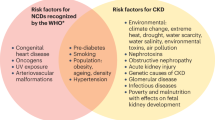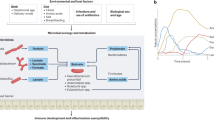Abstract
Objective: To determine to what extent biochemical markers of the nutritional and inflammatory status of young children are related to subsequent growth retardation and morbidity.
Design: Population-based follow-up study of a cohort of children from admission to final survey round six months later.
Setting: Health area in Northern Kivu, Zaire.
Subjects: 842 children under two years of age of whom about one-third gave informed consent to capillary blood collection.
Main outcome measures: Concentration of albumin, transferrin, transthyretin, α1-acid glycoprotein, C-reactive protein, and complement component C3 at baseline, and three and six months later. Incremental growth per 1 month, 3 months and 6 months of follow-up. Cumulative incidence of disease per 1 month and 3 months interval.
Results: A high proportion of children was with low concentrations of transport proteins and high concentrations of acute-phase reactants. Weight growth and arm circumference growth did not vary significantly with respect to initial concentrations of biomarkers, but subsequent height growth was lower in children with high values of transferrin, α1-acid glycoprotein, and complement component C3 at baseline. Cumulative incidence of malaria, respiratory illness, and diarrhoea was not significantly affected by the concentration of the biomarkers at baseline.
Conclusions: In this part of central Africa performing biochemical measurements should not be encouraged as a means for risk scoring in non-hospitalized children.
Sponsorship: This research has been carried out on behalf of the Centre Scientifique et Médical de l’Université Libre de Bruxelles pour ses Activités de Coopération, which is a non-profit organization supported by the Belgian Agency for International Development, and by the European Commission. This work was supported in part by grants from the Fondation Universitaire David et Alice Van Buuren, the Fonds National de la Recherche Scientifique et Médicale (Contract 3.4526.90.F), the UNICEF representative in Zaire, and the SANRU Basic Rural Health Project (Project 660-0107 USAID, DSP, ECZ).
This is a preview of subscription content, access via your institution
Access options
Subscribe to this journal
Receive 12 print issues and online access
$259.00 per year
only $21.58 per issue
Buy this article
- Purchase on Springer Link
- Instant access to full article PDF
Prices may be subject to local taxes which are calculated during checkout
Similar content being viewed by others
Author information
Authors and Affiliations
Rights and permissions
About this article
Cite this article
Tonglet, R., Lembo, E., Dramaix, M. et al. Weakness of biochemical markers of nutritional and inflammatory status as prognostic indices for growth retardation and morbidity of young children in central Africa. Eur J Clin Nutr 51, 148–153 (1997). https://doi.org/10.1038/sj.ejcn.1600375
Received:
Accepted:
Issue Date:
DOI: https://doi.org/10.1038/sj.ejcn.1600375



